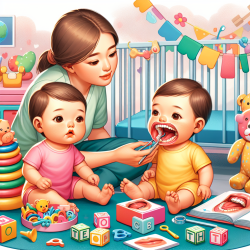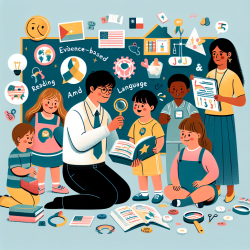Introduction
In the realm of speech-language pathology, data-driven decisions are pivotal in crafting effective interventions. A recent study titled "Receptive and Expressive Vocabulary Skills and Their Correlates in Mandarin-Speaking Infants with Unrepaired Cleft Lip and/or Palate" offers valuable insights into the challenges faced by Mandarin-speaking infants with cleft lip and/or palate (CL/P). This blog post delves into the findings of this study and explores how practitioners can leverage these insights to enhance outcomes for these children.
Understanding the Study
The study, conducted by Ma et al. (2020), involved 134 Mandarin-speaking infants aged 9-16 months with unrepaired CL/P. The research aimed to identify receptive and expressive vocabulary skills and their correlates among these infants. The study found that delays in vocabulary skills were prevalent, with 72.39% of infants exhibiting delays in receptive vocabulary skills and 85.07% in expressive vocabulary skills. The study highlighted age and cleft type as significant factors influencing these delays.
Key Findings and Implications
- Infants aged 11-13 months and 14-16 months were more likely to experience delays in expressive vocabulary skills compared to those aged 8-10 months.
- Infants with hard/soft cleft palate were at a higher risk of vocabulary skill delays.
- Longer interaction times with caregivers showed a potential positive impact on receptive vocabulary skills.
These findings underscore the importance of early identification and intervention for infants with CL/P. By understanding the specific challenges faced by Mandarin-speaking infants, practitioners can tailor interventions to address these unique needs.
Actionable Insights for Practitioners
For practitioners working with Mandarin-speaking infants with CL/P, the study offers several actionable insights:
- Early Screening: Implement early screening programs to identify infants at risk of vocabulary delays. This can facilitate timely interventions and support better developmental outcomes.
- Customized Interventions: Develop interventions that consider the age and cleft type of the infant. Tailoring interventions to these factors can enhance their effectiveness.
- Caregiver Involvement: Encourage caregivers to engage in regular, meaningful interactions with their infants. This can positively influence vocabulary development and foster a supportive learning environment.
Encouraging Further Research
While this study provides valuable insights, it also highlights the need for further research in this area. Future studies could explore the long-term impact of early interventions on language development in Mandarin-speaking infants with CL/P. Additionally, research could investigate the role of cultural and environmental factors in shaping vocabulary skills.
To read the original research paper, please follow this link: Receptive and Expressive Vocabulary Skills and Their Correlates in Mandarin-Speaking Infants with Unrepaired Cleft Lip and/or Palate.










